A Mean Stack Developer is a full-stack developer who works with a specific set of technologies to build dynamic web applications. They use MongoDB, Express.js, Angular, and Node.js to create robust and scalable solutions that can handle both front-end and back-end development tasks.
Mean Stack Developers need to be proficient in JavaScript, as it is the common language across all the technologies in the stack. They should also have skills in database management, server-side development, and front-end frameworks, along with problem-solving and effective communication abilities.
Candidates can write these abilities in their resumes, but you can’t verify them without on-the-job Mean Stack Developer skill tests.
In this post, we will explore 8 essential Mean Stack Developer skills, 10 secondary skills and how to assess them so you can make informed hiring decisions.
Table of contents
8 fundamental Mean Stack Developer skills and traits
The best skills for Mean Stack Developers include MongoDB Proficiency, Express.js Knowledge, Angular Expertise, Node.js Skills, RESTful APIs, JSON Manipulation, Asynchronous Programming and Version Control.
Let’s dive into the details by examining the 8 essential skills of a Mean Stack Developer.
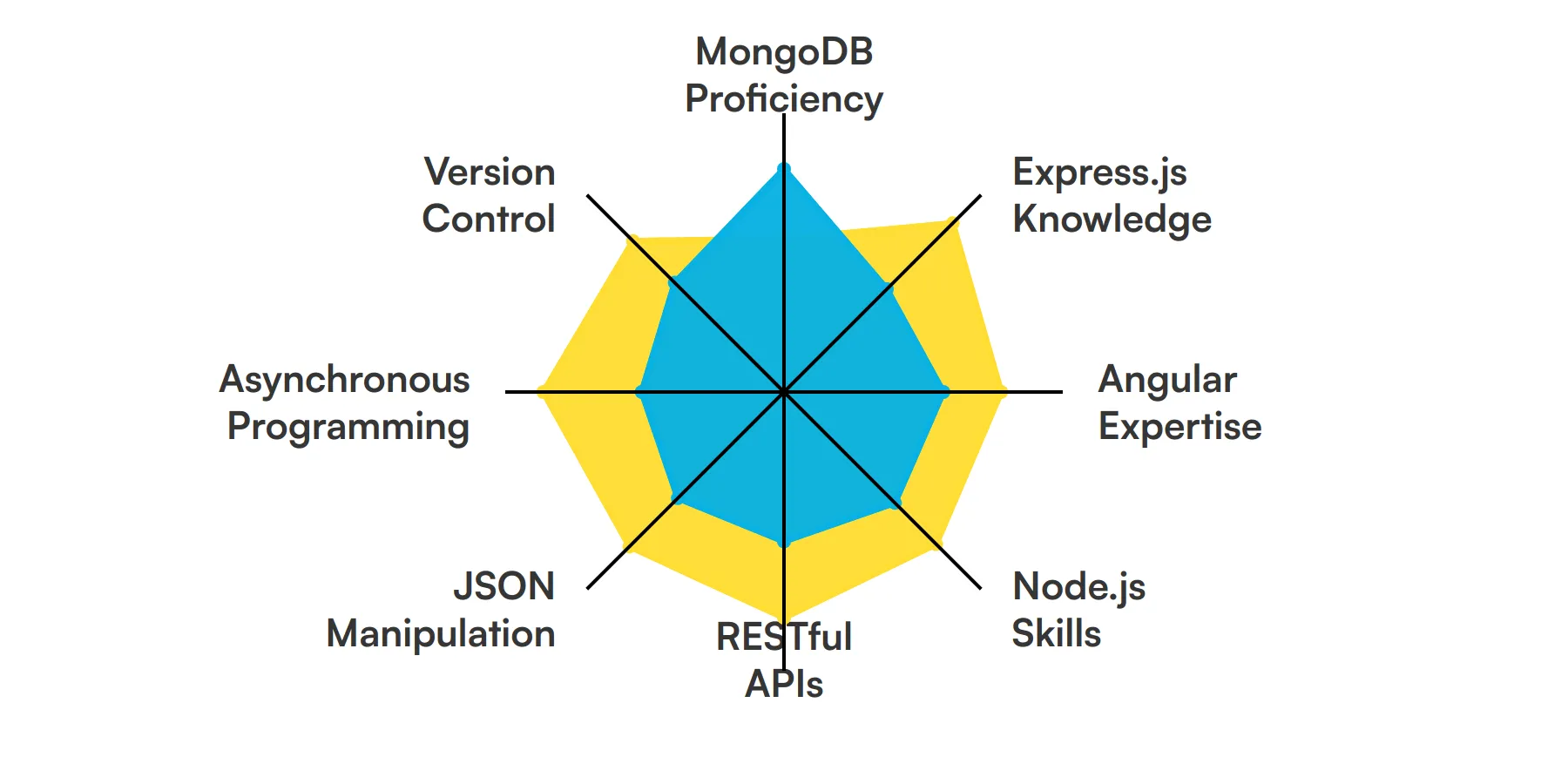
MongoDB Proficiency
A MEAN stack developer must be adept at MongoDB, a NoSQL database that stores data in JSON-like documents with dynamic schemas. This skill is crucial for managing the data layer of applications, enabling developers to handle large volumes of data and perform operations efficiently.
For more insights, check out our guide to writing a MongoDB Developer Job Description.
Express.js Knowledge
Express.js is a web application framework for Node.js, designed for building web applications and APIs. MEAN stack developers use Express.js to streamline server-side logic and handle routes, middleware, and server-side functions effectively.
Angular Expertise
Angular is a platform for building mobile and desktop web applications. As a core part of the MEAN stack, Angular allows developers to create dynamic and responsive user interfaces, utilizing its powerful data binding and dependency injection features.
Check out our guide for a comprehensive list of interview questions.
Node.js Skills
Node.js is essential for MEAN stack developers as it allows them to execute JavaScript on the server side. This skill is key for developing scalable and fast network applications that can handle many simultaneous connections with high throughput.
RESTful APIs
Understanding and implementing RESTful services is fundamental for MEAN stack developers. This involves designing APIs that allow the client and server to communicate through a set of stateless operations, crucial for web service development and integration.
JSON Manipulation
JSON is the primary format for data interchange in the MEAN stack. Developers must be proficient in manipulating JSON to efficiently handle data between the database, server, and client-side of an application.
Asynchronous Programming
Asynchronous programming is a model that allows MEAN stack developers to handle tasks concurrently rather than sequentially. This skill is vital for improving the performance of applications by making efficient use of system resources.
Version Control
Version control systems like Git are indispensable for MEAN stack developers to manage changes to the project codebase, collaborate with other developers, and maintain a history of modifications and updates.
10 secondary Mean Stack Developer skills and traits
The best skills for Mean Stack Developers include Web Security Practices, Testing Frameworks, UI/UX Design, Agile Methodologies, Cloud Services, Database Management, Continuous Integration, Socket Programming, API Design and Debugging Techniques.
Let’s dive into the details by examining the 10 secondary skills of a Mean Stack Developer.
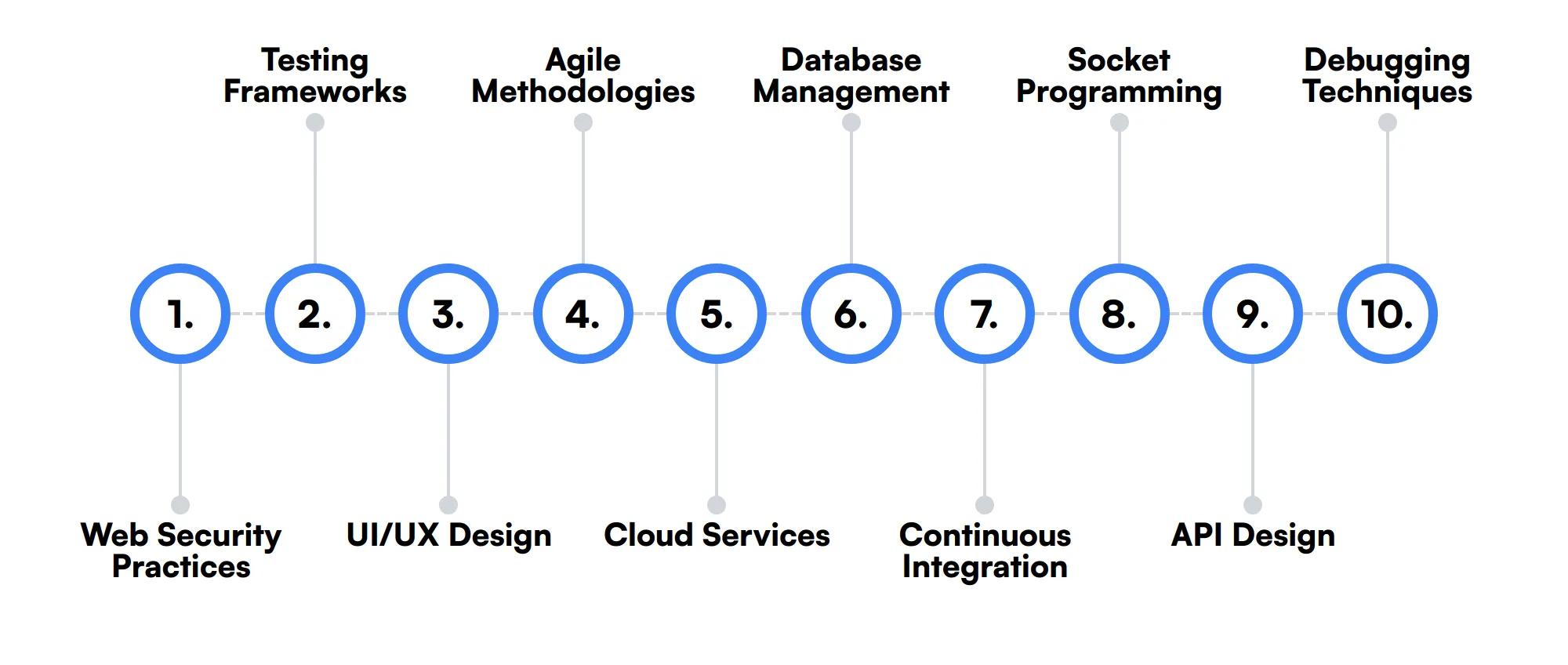
Web Security Practices
Knowledge of security practices such as HTTPS, data encryption, and secure token handling is important to protect applications from vulnerabilities and attacks.
Testing Frameworks
Familiarity with testing frameworks like Jasmine or Mocha is beneficial for MEAN stack developers to ensure the reliability and performance of applications through automated testing.
UI/UX Design
While not primarily their role, having a good sense of UI/UX design can help MEAN stack developers create more user-friendly and aesthetically pleasing applications.
Agile Methodologies
Experience with agile methodologies can aid MEAN stack developers in managing projects more effectively, adapting to changes quickly, and delivering work in iterative sprints.
Cloud Services
Understanding of cloud services like AWS or Azure enables MEAN stack developers to deploy and manage applications more efficiently, leveraging cloud infrastructure for scalability and performance.
Database Management
Skills in database management and performance optimization are useful for MEAN stack developers to ensure that the application handles data efficiently and scales well under load.
Continuous Integration
Knowledge of continuous integration tools helps MEAN stack developers automate the testing and deployment processes, increasing the development speed and reducing the chances of bugs in production.
Socket Programming
Understanding socket programming is beneficial for MEAN stack developers looking to implement real-time features like chat applications or live notifications.
API Design
Skill in API design is crucial for creating efficient and scalable server-side applications, allowing for better integration with various frontend and backend components.
Debugging Techniques
Proficiency in debugging is essential for quickly identifying and fixing issues in the application, ensuring stability and optimal performance.
How to assess Mean Stack Developer skills and traits
Assessing the skills and traits of a Mean Stack Developer can be a challenging task. It's not just about knowing the technologies but also about understanding how well a candidate can integrate and utilize them together. From MongoDB proficiency to Angular expertise, each skill plays a significant role in the overall performance of a Mean Stack Developer.
Traditional resumes and interviews often fall short in providing a clear picture of a candidate's true capabilities. This is where skills-based assessments come into play. By leveraging tools like Adaface on-the-job skill tests, you can significantly reduce screening time by 85% and improve the quality of hires by 2x. These assessments help you evaluate a candidate's practical knowledge in areas such as Express.js, Node.js, RESTful APIs, and more.
Let’s look at how to assess Mean Stack Developer skills with these 6 talent assessments.
MongoDB Online Test
Our MongoDB Online Test evaluates a candidate's ability to design effective NoSQL schemas, perform CRUD operations, and optimize MongoDB clusters.
The test covers MongoDB basics, data modeling, CRUD operations, primary data types, query language, documents and collections, aggregation framework, query plan, profiler, replica sets, sharding, vertical scaling, fault tolerance, deployment, indexes, performance, security, backup, and recovery.
Candidates who score well demonstrate a strong understanding of MongoDB's architecture, performance optimization techniques, and security measures.
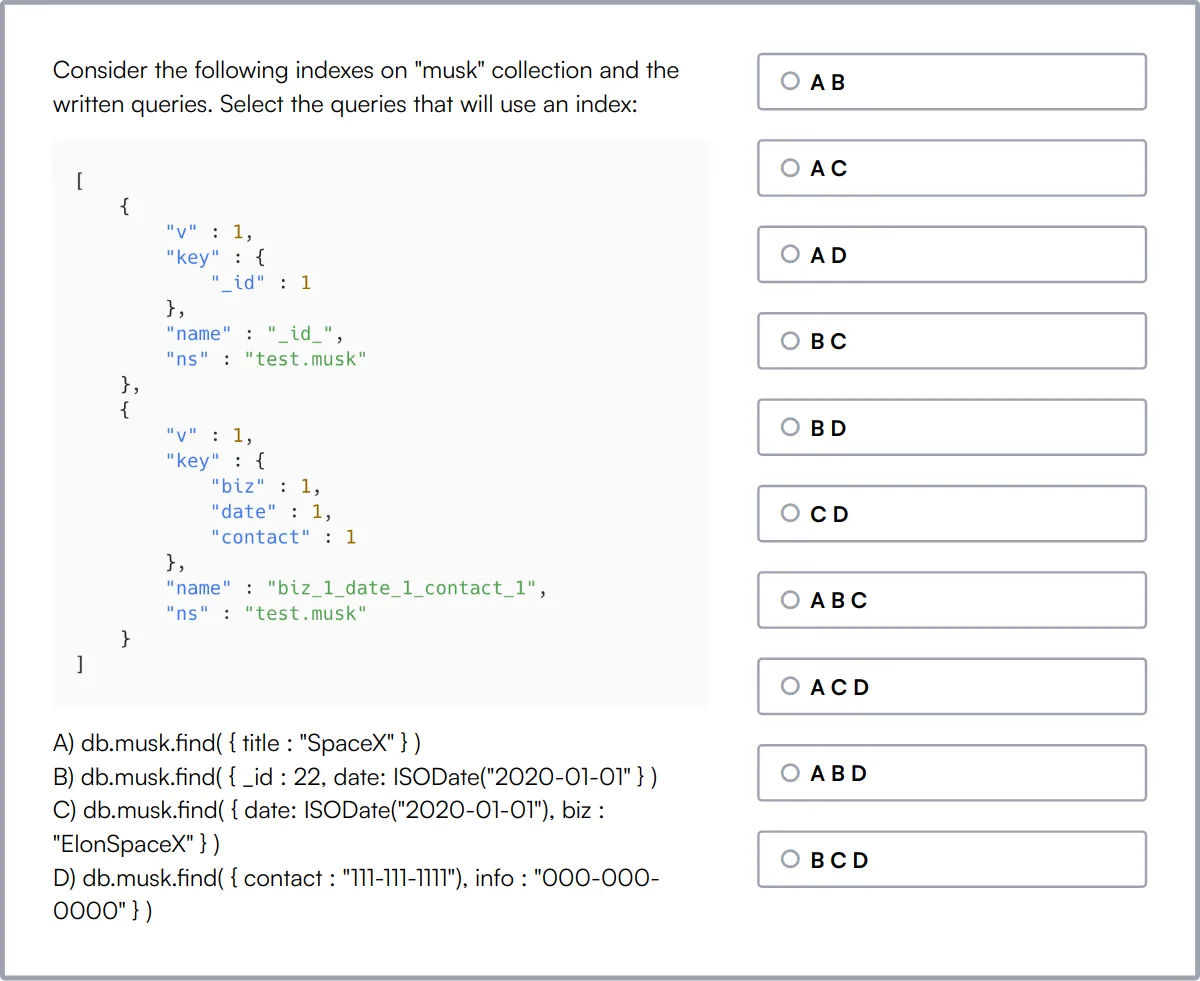
Node.js Online Test
Our Node.js Online Test assesses a candidate's ability to use Express.js, handle REST APIs, and structure Node applications.
The test evaluates skills in Node.js module system, file system, command line arguments, debugging, asynchronous programming, REST APIs, API authentication, security, testing, NPM packages, middlewares, event loop, timers, and Express.js framework.
High-scoring candidates show proficiency in building and deploying Node.js applications, using NPM packages, and connecting to databases.
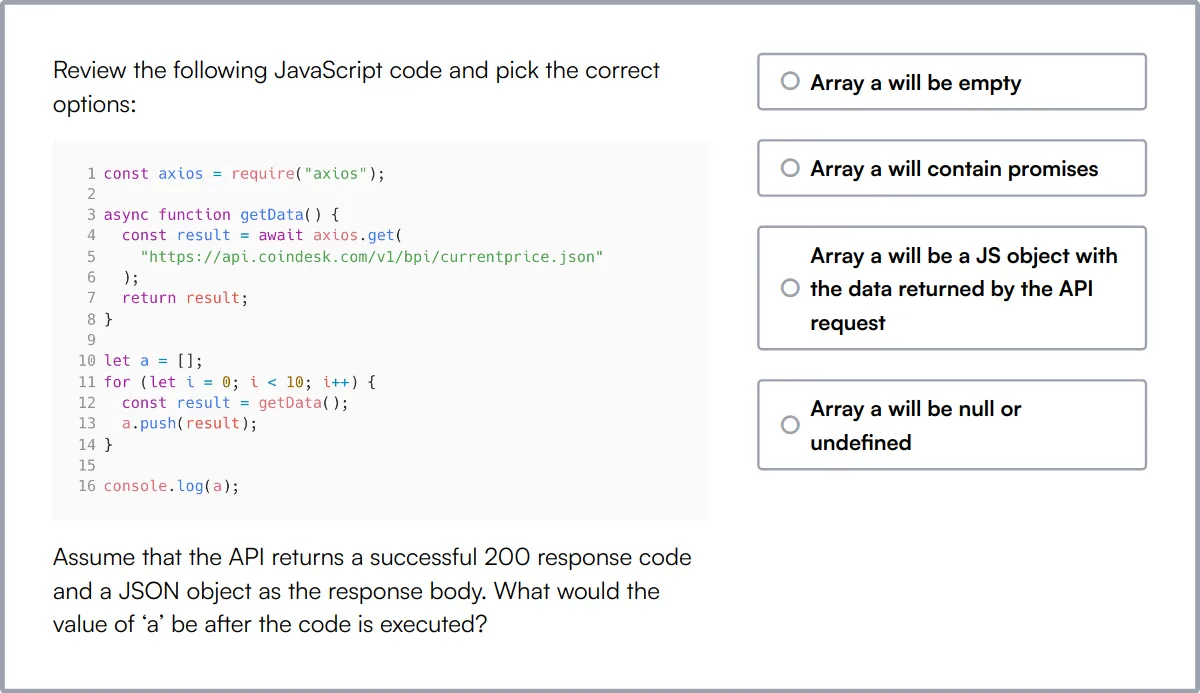
Angular Online Test
Our Angular Online Test screens for the ability to develop responsive and scalable single-page web applications using the Angular framework.
The test covers JavaScript and HTML/CSS fundamentals, Angular components, pipes, directives, core modules, routing, navigation, data binding, event handling, backend connections, reactive extensions, observables, performance improvements, and dependency injection.
Successful candidates demonstrate strong skills in Angular framework basics, connecting applications with backend APIs, and writing efficient modular components.
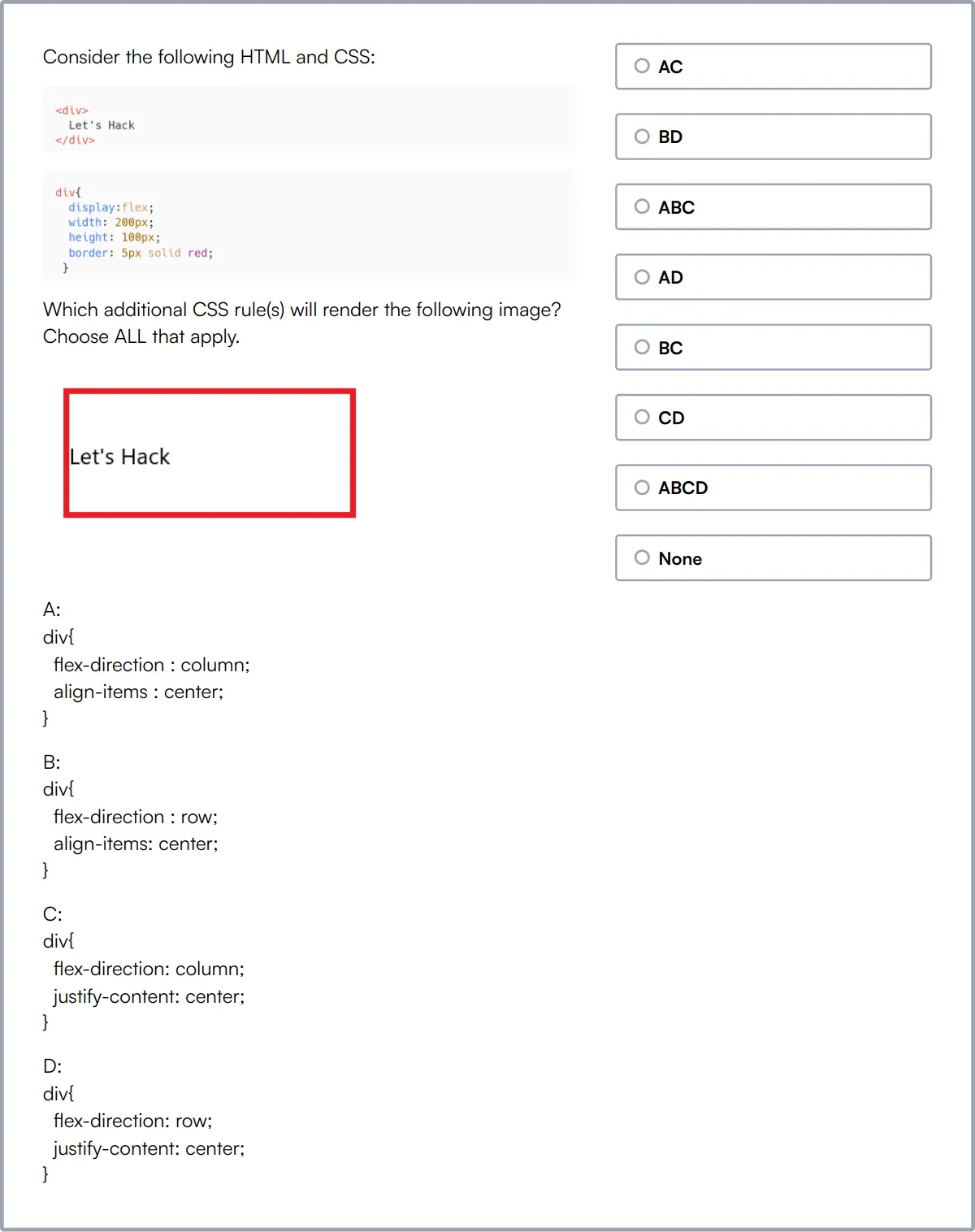
JavaScript & NodeJS Online Test
Our JavaScript & NodeJS Online Test evaluates candidates on their understanding of JavaScript programming for server-side development using Node.js.
The test assesses knowledge in JavaScript basics, ES6, OOPs, handling APIs, asynchronous programming, Node.js module system, request-response lifecycle, and JavaScript programming.
Candidates who perform well show proficiency in Node.js architecture, features, and functionalities, including modules, events, streams, and file system.
REST API Test
Our REST API Test evaluates a candidate's understanding of RESTful APIs and their ability to create, interact, and test them.
The test covers REST principles, HTTP methods, status codes, authentication, serialization formats, and best practices.
High-scoring candidates demonstrate strong skills in designing backend services and coding RESTful APIs.
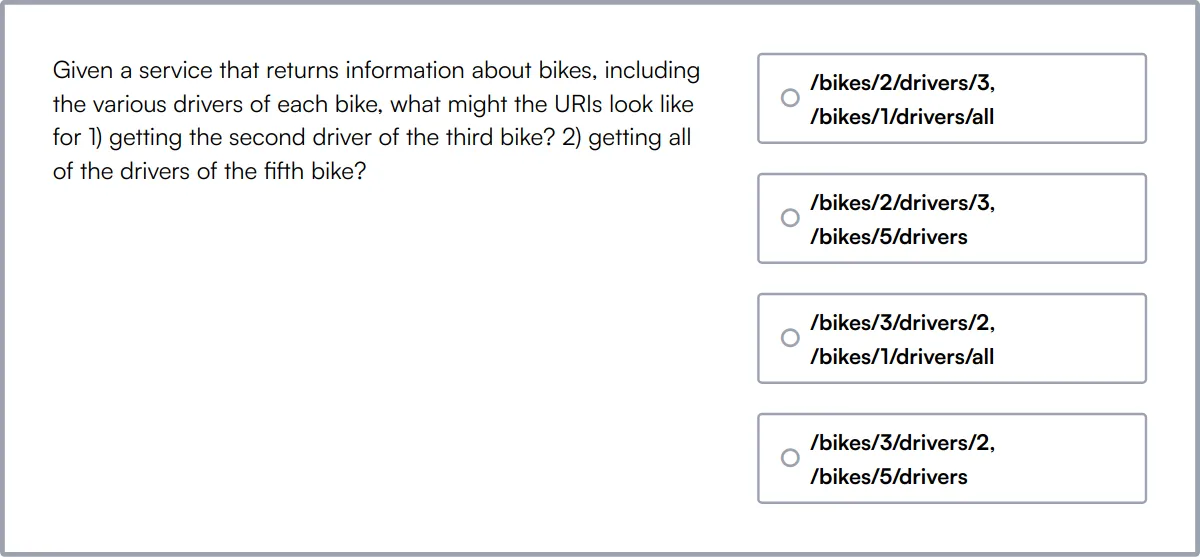
Elasticsearch Test
Our Elasticsearch Test evaluates candidates' ability to design and deploy Elasticsearch clusters, configure search queries, and manage data ingestion and indexing.
The test covers data indexing, search queries, document retrieval, aggregations, cluster management, data modeling, performance optimization, monitoring, troubleshooting, security, scaling, and integration with other systems.
Candidates who score well show proficiency in Elasticsearch architecture, performance optimization, and security measures.
Summary: The 8 key Mean Stack Developer skills and how to test for them
| Mean Stack Developer skill | How to assess them |
|---|---|
| 1. MongoDB Proficiency | Evaluate a developer's ability to handle MongoDB operations and optimizations. |
| 2. Express.js Knowledge | Assess understanding and application of Express.js in building server-side applications. |
| 3. Angular Expertise | Check proficiency in building dynamic, scalable web applications using Angular. |
| 4. Node.js Skills | Determine capability to build efficient server-side applications with Node.js. |
| 5. RESTful APIs | Review skills in designing and integrating scalable RESTful services. |
| 6. JSON Manipulation | Test ability to parse and generate JSON data effectively. |
| 7. Asynchronous Programming | Examine proficiency in handling asynchronous operations in JavaScript. |
| 8. Version Control | Assess familiarity and usage of version control systems like Git. |
Java & Spring Online Test
Mean Stack Developer skills FAQs
What is the importance of MongoDB proficiency in a MEAN Stack Developer role?
MongoDB is a NoSQL database that allows for flexible and scalable data storage. Proficiency in MongoDB helps developers manage large datasets and perform complex queries efficiently.
How can I assess a candidate's knowledge of Express.js?
You can assess Express.js knowledge by asking candidates to build a simple RESTful API or by discussing middleware functions and routing mechanisms.
Why is Angular expertise important for MEAN Stack Developers?
Angular is used for building dynamic single-page applications. Expertise in Angular ensures that developers can create responsive and interactive user interfaces.
What are some key Node.js skills to look for in a MEAN Stack Developer?
Look for skills in asynchronous programming, event-driven architecture, and experience with Node.js modules like Express and HTTP.
How do RESTful APIs fit into the MEAN Stack?
RESTful APIs allow different parts of the application to communicate with each other. They are essential for creating scalable and maintainable web services.
What is the role of JSON manipulation in MEAN Stack development?
JSON is the standard format for data exchange in MEAN Stack applications. Proficiency in JSON manipulation is necessary for handling data between the client and server.
How can I evaluate a candidate's understanding of web security practices?
Ask about their experience with common security threats like XSS, CSRF, and SQL injection, and how they implement security measures such as HTTPS, data validation, and authentication.
What testing frameworks should a MEAN Stack Developer be familiar with?
Familiarity with testing frameworks like Jasmine, Mocha, and Karma is important for ensuring code quality and reliability in MEAN Stack applications.

40 min skill tests.
No trick questions.
Accurate shortlisting.
We make it easy for you to find the best candidates in your pipeline with a 40 min skills test.
Try for freeRelated posts
Free resources



